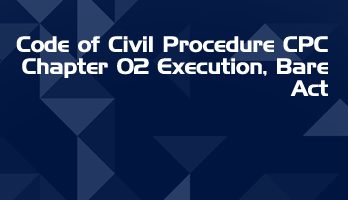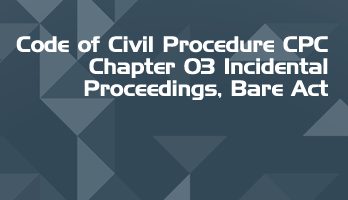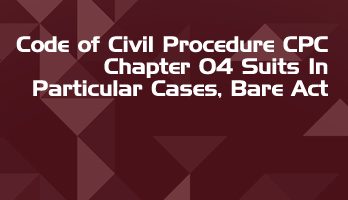A 'Bare act' is the actual legislation passed by the Parliament of India. Generally, an act sets out the high level legal and policy principles applicable to the subject matter of the law.
Most acts are accompanied by 'subsidiary legislation' such as rules, regulations, notifications and orders; which address the actual implementation detail of the act.
Free Full Course Available on LawMint's YouTube Channel
How to Land Your Dream LLB Internship in a Top Law Firm
- Part 1 - Introduction
- Part 2 - Internship Planning
- Part 3 - Internship Research
- Part 4 - Building Your Profile
- Part 5 - The Email
- Part 6 - The Resume
- Part 7 - The Cover Letter
- Part 8 - The Interview
- Part 9 - Self Development
Practical and comprehensive course, with real examples and step-by-step analysis of the complete internship application process. Check out LawMint's YouTube channel now!
Indian Divorce Act, 1869
Chapter III – Dissolution of Marriage
Section 10 – When husband may Petition for dissolution
Any husband may present a Petition to the District Court or to the High Court, praying that his marriage may be dissolved on the ground that his wife has, since the solemnization thereof, been guilty of adultery. When wife may Petition for dissolution. – Any wife may present a Petition to the District Court or to the High Court, praying that her marriage may be dissolved on the ground that, since the solemnization thereof, her husband has exchanged his profession of Christianity for the profession of some other religion, and gone through a form of marriage with another woman; or has been guilty of incestuous adultery, or of bigamy with adultery, or of marriage with another woman with adultery, or of rape, sodomy or bestiality, or of adultery coupled with such cruelty as without adultery would have entitled her to a divorce a mensa et toro, or of adultery coupled with desertion, without reasonable excuse, for two years or upwards. Contents of Petition. – Every such Petition shall state, as distinctly as the nature of the case permits, the facts on which the claim to have such marriage dissolved is founded.
Section 11 – Adulterer to be co – respondent
Upon any such Petition presented by a husband, the Petitioner shall make the alleged adulterer a co – respondent to the said Petition, unless he is excused from so doing on one of the following grounds, to be allowed by the Court –
- that the respondent is leading the life of a prostitute, and that the Petitioner knows of no person with whom the adultery has been committed;
- that the name of the alleged adulterer is unknown to the Petitioner, although he has made due efforts to discover it;
- that the alleged adulterer is dead.
Section 12 – Court to be satisfied of absence of collusion
Upon any such Petition for the dissolution of a marriage, the Court shall satisfy itself, so far as it reasonably can, not only as to the facts alleged, but also whether or not the Petitioner has been in any manner accessory to, or conniving at, the going though of the said form of marriage, or the adultery, or has condoned the same, and shall also enquire into any counter charge which may be made against the Petitioner.
Section 13 – Dismissal of Petition
In case the Court, on the evidence in relation to any such Petition, is satisfied that the Petitioner’s case has not been proved, or is not satisfied that the alleged adultery has been committed, or finds that the Petitioner has, during the marriage, been accessory to, or conniving at, the going through of the said form of marriage, or the adultery of the other party to the marriage, or has condoned the adultery complained of, or that the Petition is presented or prosecuted in collusion with either of the respondents, then and in any of the said cases the Court shall dismiss the Petition. When a Petition is dismissed by a District Court under this section, the Petitioner may, nevertheless, present a similar Petition to the High Court.
Section 14 – Power to Court to pronounce decree for dissolving marriage
In case the Court is satisfied on the evidence that the case of the Petitioner has been proved, and does not find that the Petitioner has been in any manner accessory to, or conniving at, the going through of the said form of marriage, or the adultery of the other party to the marriage, or has condoned the adultery complained of, or that the Petition is presented or prosecuted in collusion with either of the respondents, the Court shall pronounce a decree declaring such marriage to be dissolved in the manner and subject to all the provisions and limitations in sections sixteen and seventeen made and declared: Provided that the Court shall not be bound to pronounce such decree if it finds that the Petitioner has, during the marriage, been guilty of adultery, or if the Petitioner has, in the opinion of the Court, been guilty of unreasonable delay in presenting or prosecuting such Petition, or of cruelty towards the other party to the marriage, or of having deserted or wilfully separated himself or herself from the other party before the adultery complained of, and without reasonable excuse, or of such wilful neglect or misconduct of or towards the other party as has conduced to the adultery. Condonation. – No adultery shall be deemed to have been condoned within the meaning of this Act unless where conjugal cohabitation has been resumed or continued.
Section 15 – Relief in case of opposition on certain grounds
In any suit instituted for dissolution of marriage, if the respondent opposes the relief sought on the ground, in case of such a Suit instituted by a husband, of his adultery, cruelty, or desertion without reasonable excuse, or, in case of such a suit instituted by a wife, on the ground of her adultery and cruelty, the Court may in such suit give to the respondent, on his or her application, the same relief to which he or she would have been entitled in case he or she had presented a Petition seeking such relief, and the respondent shall be competent to give evidence of or relating to such cruelty or desertion.
Section 16 – Decrees for dissolution to be nisi
Every decree for a dissolution of marriage made by a High Court not being a confirmation of a decree of a District Court, shall, in the first instance, be a decree nisi, not to be made absolute till after the expiration of such time, not less than six months from the pronouncing thereof, as the High Court, by general or special order from time to time, directs. Collusion. – During that period any person shall be at liberty, in such manner as the High Court by general or special order from time to time directs, to show cause why the said decree should not be made absolute by reason of the same having been obtained by collusion or by reason of material facts not being brought before the Court. On cause being so shown, the Court shall deal with the case by making the decree absolute, or by reversing the decree nisi, or by requiring further inquiry, or otherwise as justice may demand. The High Court may order the costs of Counsel and witnesses and otherwise arising from such cause being shown, to be paid by the parties or such one or more of them as it thinks fit, including a wife if she have separate property. Whenever a decree nisi has been made, and the Petitioner fails, within a reasonable time, to move to have such decree made absolute, the High Court may dismiss the suit.
Section 17 – Confirmation of decree for dissolution by District Judge
Every decree for a dissolution of marriage made by a District Judge shall be subject to confirmation by the High Court. Cases for confirmation of a decree ‘for dissolution of marriage shall be heard (where the number of the Judges of the High Court is three or upwards) by a Court composed of three such Judges, and in case of difference the opinion of the majority shall prevail, or (where the number of the Judges of the High Court is two) by a Court composed of such two Judges, and in case of difference the opinion of the Senior Judge shall prevail. The High Court, if it thinks further enquiry or additional evidence to be necessary, may direct such enquiry to be made, or such evidence to be taken. The result of such enquiry and the additional evidence shall be certified to the High Court by the District Judge, and the High Court shall thereupon make an order confirming the decree for dissolution of marriage, or such other order as to the Court seems fit: Provided that no decree shall be confirmed under this section till after the expiration of such time, not less than six months from the pronouncing thereof, as the High Court by general or special order from time to time directs. During the progress of the suit in the Court of the District Judge, any person suspecting that any parties to the suit are or have been acting in collusion for the purpose of obtaining a divorce, shall be at liberty, in such manner as the High Court by general or special order from time to time directs. to apply to the High Court to remove the suit under section eight, and the High Court shall thereupon, if it thinks fit, remove such suit and try and determine the same as a Court of original jurisdiction, and the provisions contained in section sixteen shall apply to every suit so removed: or it may direct the District Judge to take such steps in respect of the alleged collusion as may be necessary to enable him to make a decree in accordance with the justice of the case.
Section 17A – Appointment of officer to exercise duties of King’s Proctor
The Government of the State within which any High Court exercises jurisdiction, may appoint an officer who shall, within the jurisdiction of the High Court in that State, have the like right of showing cause why a decree for the dissolution of a marriage should not be made absolute or should not be confirmed, as the case may be, as is exercisable in England by the King’s Proctor; and the said Government may make rules regulating the manner in which the right shall be exercised and all matters incidental to or consequential on any exercise of the right.
Important Central Acts in Regional Languages
Legislative department website also features regional language versions of several important Central Acts.
Free Full Course Available on LawMint's YouTube Channel
How to Land Your Dream LLB Internship in a Top Law Firm
- Part 1 - Introduction
- Part 2 - Internship Planning
- Part 3 - Internship Research
- Part 4 - Building Your Profile
- Part 5 - The Email
- Part 6 - The Resume
- Part 7 - The Cover Letter
- Part 8 - The Interview
- Part 9 - Self Development
Practical and comprehensive course, with real examples and step-by-step analysis of the complete internship application process. Check out LawMint's YouTube channel now!












